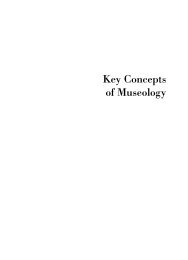ISS 25 (1995).pdf - The International Council of Museums
ISS 25 (1995).pdf - The International Council of Museums
ISS 25 (1995).pdf - The International Council of Museums
Create successful ePaper yourself
Turn your PDF publications into a flip-book with our unique Google optimized e-Paper software.
presentation <strong>of</strong> development all along the line. synopsis <strong>of</strong> scopes with a focal point and <strong>of</strong> the<br />
real life 15, illustrative material in the museum, vividness <strong>of</strong> history by analogy and<br />
simultaneousness. 16<br />
Implicated in the same way should be the principle <strong>of</strong> "language" (speech) in its own and in a<br />
rendered sense, with the objects <strong>of</strong> past as "a basis for an integrative construction <strong>of</strong> historical<br />
completeness." 17<br />
Out <strong>of</strong> this great diversity <strong>of</strong> possibilities, I have in my mind as a purpose to select only two<br />
categories, namely the rank <strong>of</strong> the historic dimension in view <strong>of</strong> common problems <strong>of</strong><br />
museums, and in contrast to it the basi cal idea <strong>of</strong>" scopes <strong>of</strong> the real life" as well as their actual<br />
reflexion in museums and memorial sites and document-centers <strong>of</strong> contemporary history.<br />
<strong>The</strong> historic dimension and "scopes <strong>of</strong> the real life"<br />
After these considerations it will be tried to exposed some examples how actual problems in<br />
museums, houses <strong>of</strong> history, and in historic sites and memorial places belonging to museums<br />
are dealed with. Also interesting is the discussion <strong>of</strong> themes <strong>of</strong> contemporary history, and,<br />
under respect to the community and the education in politics, how the reactions <strong>of</strong> museum<br />
conditions and the "history <strong>of</strong> future" are generally discussed. <strong>The</strong> representation <strong>of</strong><br />
contemporary history in museum is a subject high-explosive; otherwise than the general<br />
presentation in museums <strong>of</strong> art, history or cultural-history it has immediately the target <strong>of</strong><br />
political education and <strong>of</strong> developing the democracy.<br />
<strong>The</strong>refore the common-social connections with the museum-tasks are here more intensively<br />
than in other types <strong>of</strong> museums. In contrast to traditional conceptions <strong>of</strong> museums, especially<br />
the contemporary history challenges novel, innovative and communicative designs in order to<br />
fulfill its important task in view <strong>of</strong> a common and a socio-political effectiveness. Already<br />
Humboldt was anxious to regard the "heads and sense <strong>of</strong> a different kind" .18 That means in<br />
relation to a museum <strong>of</strong> contemporary history nothing else than to consider how different<br />
museum-visitors take notice <strong>of</strong> our world and reflect the political appearance and, finally,<br />
which conclusions they decide. In addition to that and under respect to the conditions <strong>of</strong><br />
museums, the" great variety by that the objects outside move our senses" 19 is to be paid the<br />
way <strong>of</strong> attention. In the "50th year <strong>of</strong> commemorating" after the end <strong>of</strong> the NS-regime this<br />
claim concentrates in the presence <strong>of</strong> contemporary historic museums and KZ-memorial places.<br />
<strong>The</strong> present political situation challenges their explication on the part by the responsibles and<br />
guarantees in addition to that significance in the whole community as well as public interest.<br />
Years <strong>of</strong> commemoration by all means pursue the purpose, to recall and bring political topics<br />
generally into the consciousness. With this intention they hope to awake newly this subjects to<br />
life and to prevent their going to ruin as a "dead matter".<br />
Democratic Museum<br />
Setting a strong light to the present museum position face to face with the community today,<br />
museums are generally characterized to have to be democratic. " A democratic museum isn't<br />
one that writes chronicles <strong>of</strong> wars in golden capitals or one that stylizes the powerfuls to<br />
supermen. Rather it informs about the history <strong>of</strong> people, about the social-history <strong>of</strong> average-<br />
15<br />
16<br />
17<br />
18<br />
19<br />
as Ill. 3. Bd .. 2.H. 1815·1834. s. 541.<br />
OS IV, 2. S. 47.<br />
Bann. Stephen: Poetik des Musewn - Lenoir und du Sonunerard. In: RUsen. JJ E.rru.t. W.I GrOner, H.Th. Gescillcht.e sehen. Beitrag.;:<br />
zur A.sthctik. histonschcr Mu.sc:en. Praffenweiler 1988. S. 35-49.<br />
OS L 7: <strong>The</strong>orie der- Bildung des Menschen. BruchstOck (1793). S. 287.<br />
Ebenda. s. 285.<br />
109
















